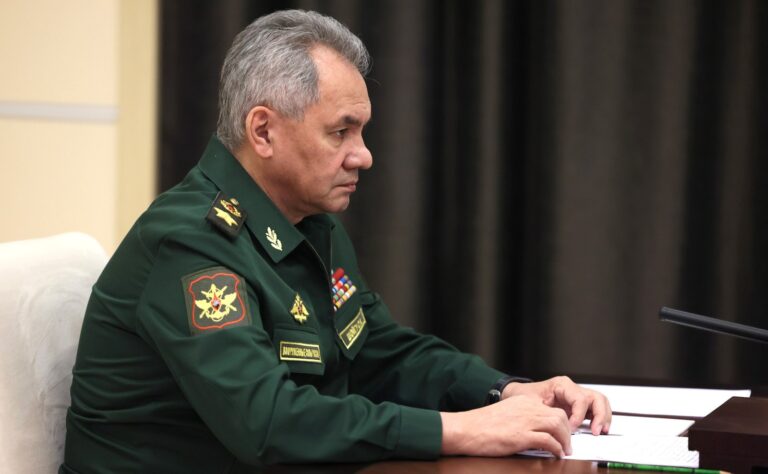IN BRIEF: MAY 9, 2024
Stories from the past week relevant to the threat from authoritarian powers and strategic corruption – and efforts to respond.
Shoigu out of the Ministry of Defense after Russian cabinet reshuffle: Russian President Vladimir Putin has appointed Andrei Belousov, a civilian economist, to replace Sergei Shoigu as Minister of Defense. The change came at the start of Putin’s fifth term in office as president. Shoigu, a close Putin ally whose stint as Defense Minister was associated with rampant corruption, mismanagement of the early phases of the war in Ukraine, and a deadly rivalry with the late Wagner chief Yevgeniy Prigozhin, will stay on as secretary of the Security Council. The move, compounded with unprecedented defense expenditures and industrial mobilization, may indicate that the existential pressure to prevail in the Ukraine war is driving Putin to transform the Russian state from a de facto front business for the systemic corruption through which his regime has actually governed to a set of genuine institutions oriented toward military victory. This could be a worrisome trend for the U.S. and its allies, as Russia’s threat to NATO countries increasingly comes not only from weaponized corruption, but from actual weapons. At the same time, Russians will recall the experience of Minister Anatoly Serdyukov, Shoigu’s predecessor, another “outsider” to the uniformed establishment like Belousov, who ended up facing criminal charges.
From plots against Zelensky to arson in England, authoritarians on the offensive with sabotage and subversion: Ukrainian officials reported on 7 May that they had foiled a plot to assassinate President Zelensky and a number of other Ukrainian officials by the Russian Federal Security Service (FSB). Notably, two of those arrested were colonels in the Ukrainian state protective services. The arrests accompany recent revelations about Russia’s alleged planning of violent plots in Europe, including arson attacks in the UK and Germany. Moreover, on May 8, the UK announced the expulsion of the Russian defense attache to the UK, Colonel Maksim Elovik, on accusations that he was an undeclared military intelligence agent, and that the FSB was involved in a pattern of “malign activity” throughout Europe. And the Ukraine plot coincides with reporting about Chinese and Iranian targeting of dissidents abroad. These incidents underline that Russia and other authoritarian countries remain willing to carry out subversion, sabotage, and even violent attacks – including assassinations – around the world. As some commentators have suggested, this behavior – especially Russia’s “malign activity” – looks like not simply normal spying, but a significant escalatory trend.
Special delivery: The upcoming 14th EU sanctions package plans to target the trade of Russian LNG, the “shadow fleet” of tankers shipping Russian crude above the price cap, and technology for Russian military industry, according to recent reporting. The package also promises to increase compliance standards for EU-based entities. At the same time, it is important to remember that violating sanctions is, broadly speaking, a financial crime, and the agencies that enforce them are domestic, financial regulatory bodies with often competing priorities and, in many countries, they are woefully underfunded. In the EU, this leaves member states with the task of beefing up enforcement to ensure sanctions have teeth and are actively enforced .
More of a good thing, but is it enough? The Pentagon innovation chief recently called for a “bigger, faster” version of the Replicator program, announced last year, which is designed to put “thousands” of “attrittable” small drones in the hands of troops by 2025. The Pentagon’s increasing interest in small combat drones – the emblematic weapons of the war in Ukraine – is wise, but with Ukrainian troops going through 10,000 such drones a month and Ukrainian drone producers constantly innovating to meet battlefield developments, mass producing FPV drones from commercial Chinese components for a few hundred Euros each, it’s an open question whether even an increased Replicator – and it should be noted the next version of the program has not been confirmed to focus on drones – will position either US industry to compete in this rapidly-evolving market, or the US military to compete with threats in a potential future war where drones saturate the battlefield.
Ukraine hits another Russian refinery: The Ukrainian SBU special service attacked a Gazprom refinery in the Russian state of Bashkortostan and then a facility in Volgograd in recent days, the latest in a series of strikes. While Biden Administration officials have expressed concern about such strikes, an analysis published in Foreign Affairs suggests that Ukraine is using the attacks as part of a strategy to use market mechanisms as levers against Russia while leaving global crude prices alone – unrefined Russian oil ends up being exported, putting downward pressure on crude prices – and it appears to be working.
Treasury tours Southeast Asia, and not for the beaches: Top U.S. Treasury sanctions officials visited Malaysia and Singapore this past week as part of a U.S. diplomatic effort to counter Iranian oil trafficking and other illicit activities in the region, which have allegedly been used to finance terrorist groups and drone production. Since the full-scale invasion of Ukraine, Southeast Asia has emerged as a hub for Russian military industry sanctions evasion, and an incident where a tanker with Venezuelan oil ran aground near Singapore in December also illustrates both the region’s role as a key juncture in the “dark fleet” oil trade, and the way in which authoritarian powers around the world are increasingly tied together by illicit economic activities.
With oil sanctions on Venezuela reimposed, might Essequibo become the Donbas of Latin America? Since last year, Venezuela has been making noises about a potential invasion of Guyana to seize the disputed border region of Essequibo, as discussed in an Atlantic article published 4 May. The rhetoric from the government of Venezuelan President Nicolás Maduro – culminating in a Venezuelan referendum asserting sovereignty over Essequibo, whose results were signed into law last month – may well be more political theater than policy, given upcoming elections. But the recent reimposition of US sanctions on Venezuelan oil may drive the country deeper into the arms of its authoritarian allies and their illicit trade networks, and the threat of a military move to seize the territory from Guyana can’t be discounted.
Russian aircraft flying on American parts: The Ukrainian Independent Anti-Corruption Commission (NAKO) nonprofit is due to release a report detailing Russian use of foreign components in its aviation sector, the Daily Beast reported Monday, an alleged 60% of which come from American manufacturers. The components in question are primarily microelectronics, which will be well-known to watchers of Russian sanctions-evasion schemes. Such items are used in drones and missiles as well as aircraft, and are the bane of regulators; small, widely available on global markets, and easy to smuggle in substantial quantities, they are moved through complex networks of third-party middlemen to illicit customers without the manufacturers’ awareness and are thus notoriously difficult to control. Additionally, the report will mention CNC machines, which have received increasing regulatory attention in recent months as a more fruitful target of sanctions and export controls.
Sen. Menendez trial highlights threat of foreign strategic corruption: The federal corruption trial of US Senator Bob Menendez (D-NJ) begins this week in Manhattan, with the Senator’s wife and two businessmen allegedly linked to the governments of Egypt and Qatar, respectively, as co-defendants. One hardly needs a crystal ball to predict that media coverage will likely focus on the details of Senator Menendez’s alleged indiscretions, with plenty of partisan point-scoring in the comments. However, more attention is needed on the intent of the Senator’s alleged foreign state interlocutors. Information currently available suggests the two foreign governments allegedly involved were not seeking to undermine US security. However, while both are major non-NATO allies, both are also authoritarian regimes with records of serious human rights violations, and while the alleged Qatari interest in Senator Menendez appears to have been for political support and profit, the charges allege that Menendez used his influence to push through military aid to Egypt despite human rights concerns. The case highlights the risks posed by the presence of authoritarian state agents in US systems – even when those states are nominally partners.
A step closer to direct NATO military intervention in Ukraine? Estonia is “seriously considering” sending support troops to Ukraine to allow the beleaguered nation to free up forces for combat, Breaking Defense reported today. Talk of the potential deployment of NATO troops to Ukraine has increased in recent months, starting with French President Emmanuel Macron’s February statement that the deployment of French troops to Ukraine could not be ruled out. In response to a 7 May public petition to the Ukrainian President’s Office calling for Ukraine to request the deployment of NATO troops to assist the war effort, Kremlin spokesman Dmitry Peskov asserted that such a deployment would represent a “huge danger”. While the idea of committing U.S. and allied forces directly to the meat grinder of Ukraine is hardly appealing to Western electorates or policymakers, Ukraine has acute manpower issues and is facing a massive Russian force in the Donbas, and the time may soon come when the West must risk blood as well as treasure to hold the front lines of democracy.

